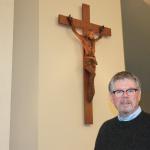This is worth revisiting: a terrific reflection by the great Deacon Bill Ditewig from two years ago.
The rites leading up to the chanting of the Exsultet parallel precisely the rites followed prior to the Gospel proclamation. The deacon approaches the presider and asks for a blessing. Before the Gospel, the presider will pray,
“May the Lord be in your heart and on your lips, that you may proclaim his Gospel worthily and well, in the name of the Father, and of the Son, and of the Holy Spirit.”
After placing the Paschal Candle in its stand at the Easter Vigil, the Deacon approaches the presider and asks for a blessing, and the presider prays in almost identical words,
“May the Lord be in your heart and on your lips, that you may proclaim his paschal praise worthily and well, in the name of the Father and of the Son, and of the Holy Spirit.”
Finally, the rites address the use of incense in both cases. Just as the deacon will often incense the Book of the Gospels before proclaiming the Gospel, so too does he incense the Candle before beginning the proclamation of the Exsultet. The parallels between Christ, the Cross and the Gospel could not be clearer, both in the historical Tradition as we as contemporary practice.
[img attachment=”158967″ align=”aligncenter” size=”full” /]
The message of the Exsultet for the Easter people is nothing less than a joy-filled proclamation of the Gospel of Christ. All of creation is called to rejoice at the end of “gloom and darkness.” This is the night, we hear repeatedly, that everything has changed through the power of Christ. In its most powerful passage, we are told that this is the night that “dispels wickedness, washes faults away, restores innocence to the fallen, and joy to mourners, drives out hatred, fosters concord, and brings down the mighty.” In short, the great Easter Proclamation is a shout of unrestrained joy over the Good News of our God. It is, in a very special way, the Gospel itself. It is the Deacon who has – from the charge received at ordination – a primary responsibility for the proclamation of that Gospel.
Following the reforms of Holy Week begun by Pope Pius XII in 1955, an option has been given to have a minister other than the Deacon proclaim the Exsultet. I would suggest that a primary and original reason for this option, especially in those days prior to the Second Vatican Council, was the overall absence of deacons in the Latin Church; therefore, other provisions had to be made. However, post-Conciliar editions of the General Instruction and the rubrics have returned the primary responsibility for the Exsultet and its surrounding rites to the Deacon. Notice the way the current rubrics read: “The Easter Proclamation may be made, in the absence of a deacon, by the priest himself or by another concelebrating priest. If, however, because of necessity, a lay cantor sings the Proclamation. . . ,” adjustments are then made to the text accordingly (#19). Clearly the mind of the Church is that Proclamation is the responsibility of the ordained and, in particular, the deacon, paralleling his responsibility for the Gospel. Just as in the case of the Gospel, it is only in the absence of the deacon that a priest is to proclaim the Gospel. In a similar way here, it is only in the absence of the deacon that a priest is to proclaim the Exsultet. The only difference is that, in the case of some unspecified necessity in the absence of the deacon, a lay cantor may proclaim a modified form of the Exsultet.
So we return to the basic questions which began this reflection. If the Service of Light at the Easter Vigil were simply a matter of choral performance, the answers would be simple. However, as we have seen, there is much more to the history and theology of this part of the Vigil than performance alone. After all, there are other parts of our sacramental celebrations that might easily be “performed” better by another. For example, a trained actor might bring much to the solemn Eucharistic Prayer at Mass, but we rightly insist that only a priest do so BECAUSE THERE IS MUCH MORE INVOLVED in the Eucharistic Prayer than “performance” alone. It seems the same applies to the Service of Light, culminating with the Exsultet: there is more to its proclamation than performance considerations alone.
Bill has much more on the history of this rite and the deacon’s role in it. Read it all.
I’ll just add that there are abundant good reasons for having someone else chant the Exsultet, but “Our head cantor usually does it and we don’t want to hurt their feelings” isn’t one of them. If the deacon genuinely can’t carry a tune, or has a voice that makes small children and wild animals scream, by all means, let someone else do it. Please. God will understand.
Meantime, someone captured this video of Your Humble Blogger trying his best not to botch this great piece of chant two years ago. Every year I tell my pastor the same thing, “Don’t worry. Next week, it will be better.” 🙂
https://www.facebook.com/deacongreg.kandra/posts/10205744686708875?hc_location=ufi












